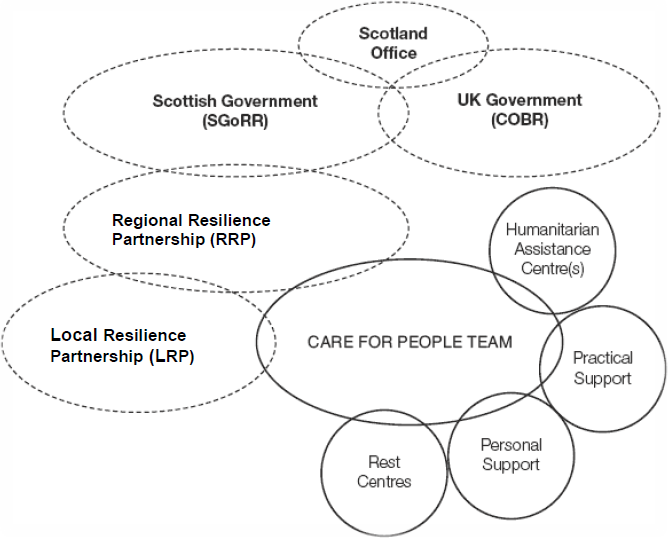Multi-agency Team
Preparing Scotland recommends establishing a number of specialist sub-groups to drive forward work in particular areas of emergency planning.
The Care for People Team is a multi-agency functional team that is active at the tactical level in preparation, response and longer-term recovery. It is one of a number of functional groups which should be established at the tactical level (for example, a Public Communications Group and a Scientific and Technical Advice Cell).
The Care for People Team both in preparation and response should comprise of representatives from all agencies and functions with a part to play in caring for people, including:
- local authorities (e.g. social care, children, adults and housing services);
- health service (e.g. primary care, mental health services);
- Police (e.g. family liaison co-ordinators);
- utilities;
- transport operators and their care teams;
- occupational health and staff welfare;
- voluntary organisations (e.g. British Red Cross, RVS, Salvation Army, St Andrews First Aid, Samaritans, Cruse, Animal Welfare Organisations);
- faith communities;
- Community Resilience Teams;
- other organisations with a role in caring for people (e.g. housing associations, private/commercial carers).
Membership should reflect local conditions and agencies. Members should be senior practitioners who would be responsible for caring for people during an emergency.
The Care for People Team’s Place in the Resilience Partnerships Framework
Caring for people affected by emergencies is predominantly provided at a local level by the relevant local authorities, NHS Boards and voluntary sector organisations through Resilience Partnerships and working with Joint Integrated Board. In doing so they should consider the needs of affected communities; those evacuated from their homes; other displaced persons; the vulnerable; the injured and bereaved; the families and friends of those affected, the welfare of those responding and any others as considered necessary.
Subsidiarity – As with all aspects of an emergency response, care for people should be responded to following the principle of subsidiarity. Local responders’ IEM arrangements are the foundation of dealing with emergencies with control of operations being exercised at the lowest practical level. The coordination and support of local activity should be at the highest level required and both principles should be mutually reinforcing. The majority of incidents are dealt with at the local level with little or no regional or government involvement. This approach has proven to be robust in Scotland.

Figure 1 represents the relationship of the Team with the Resilience Partnership management framework.
Where one response/advice group/team overlaps with another, both must ensure that effective means of communicating are in place and that individuals involved in those group/teams are aware that they are expected to make connections to facilitate coordination.
The Chair of the Care for People Team will both lead the Team and inform/advise the resilience partnership as and when necessary. They will lead the coordination of the Team's activity in implementing the Resilience Partnerships’ strategies as they affect care for people.
The person(s) linking the Care for People Team and the Resilience Partnership will seek to integrate the Team's work with that of the other functional teams responding. They will keep the Resilience Partnership informed of the Team's activity, draw upon any support the Team requires and identify if its support might help others. For example, they might ask property managers to identify and open a building as an outreach facility in a remote community, work with the Public Communications Group to inform the public of the Team's activities and services or offer to provide emotional support for agency staff.
The Care for People Team's specialist group leaders should be identified in advance with the support of their group. They will work with Team colleagues to identify the best way to implement the Resilience Partnerships’ strategy for caring for people and lead specific operational aspects of the Care for People Team's work. The team should identify appropriate mental health and social care professionals from the Health Board and Local Authority to give real-time advice to responders during both the emergency response and recovery phase. (Examples of specialist groups are shown in Figure 1 for illustrative purposes only as rest centres, personal and practical support, and humanitarian assistance centres). Group leaders will ensure that their group's operations are co-ordinated with the Team's overall activity.
Overseas Incidents
This could include arrangements required for Scottish residents involved in catastrophic incidents and repatriated.
The guidance given in this document is applicable to both overseas and UK incidents, although those occurring overseas may present different challenges. There will also be particular challenges in supporting families and friends based in the UK, since getting accurate, timely information from overseas may be more difficult than in a UK based incident. The Foreign and Commonwealth Office (FCO) is the lead department for overseas emergencies and, where available, will be able to provide information about the nature and scale of an incident. This should help UK-based responders identify what assistance returning individuals may need. For family and friends in the UK, it should be expected that they will arrive at airports or other transport hubs seeking information about loved ones and that they may wish to travel to the incident site.
Care for People Teams should work with UK Government/tour operators where the incident has taken place overseas to ensure people are able to return home and/or so that bereaved families can travel to the location of the emergency to identify and repatriate their loved one’s body.
Further information on the role of the Foreign and Commonwealth Office is provided in UK Government publication Human Aspects in Emergency Management.


